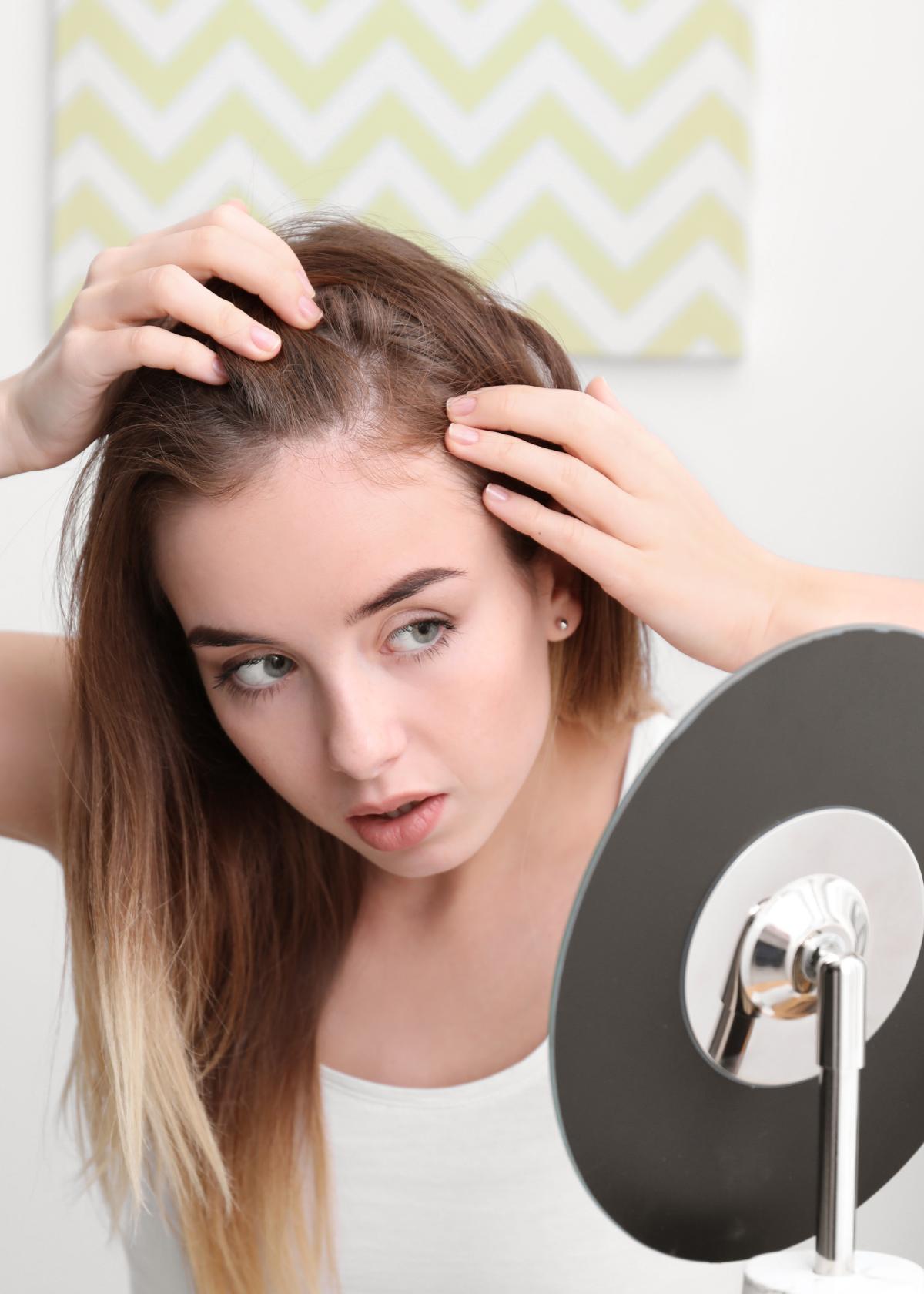Are you a teenager wondering, "Why is my hair thinning so much at 13?" You're not alone; hair loss in teens, although surprising, isn't unusual and can be due to various factors like hormonal changes or even genetics.
In this article, I will shed light on the possible reasons behind your thinning hair and provide practical solutions to help manage it. Ready to find out more? Let's unravel this hairy situation together.
First, you need to understand how much hair loss is normal for teens or girls at the age of 13. According to the American Academy of Dermatology Association, it is normal to shed between 50 and 100 hairs a day.
Common Causes of Hair Loss in Teenagers

Teenagers may experience hair loss due to various factors such as genetics, alopecia areata, malnutrition, hormonal changes, medication use, and excessive hair treatments and styling. Here are some common causes of hair loss in teenage girls:
Genetics
Genetic factors play a crucial role in teenage hair loss. If immediate family members, like parents or grandparents, have experienced hair thinning or baldness, there's an increased likelihood that the teen will also face such issues.
This is particularly true in the case of male pattern baldness, which is largely hereditary and can begin affecting teens as early as their mid-teens. Similarly, Androgenetic alopecia - a genetic condition causing hair thinning around the crown or hairline - may affect teenagers too.
It's essential to understand that these conditions don't indicate any health problems but are simply markers inherited from previous generations.
Alopecia areata
Alopecia areata is an autoimmune condition that can affect teenagers and cause hair loss in patches. It occurs when the immune system mistakenly attacks the hair follicles, leading to bald spots on the scalp or other areas of the body.
The exact cause of alopecia areata is unknown, but it is believed to be a combination of genetic and environmental factors. This condition can be unpredictable, with periods of regrowth followed by episodes of hair loss.
While there is no cure for alopecia areata, various treatment options, such as corticosteroid injections, topical medications, and immunotherapy, may help stimulate hair growth in some cases.
Malnutrition
Malnutrition can also contribute to hair loss in teenagers. When the body doesn't receive enough essential nutrients, it can affect the health of the hair follicles and lead to thinning hair. Malnutrition means you are making your own hair worse.
A lack of adequate protein, vitamins (especially iron), and minerals can weaken the hair shafts and make them more prone to breakage. It's important for teenagers to maintain a balanced diet and proper nutrition that includes foods rich in nutrients necessary for healthy hair growth.
Hormonal Changes
Hormonal changes during puberty can contribute to hair loss in teenagers. As the body undergoes hormonal fluctuations, it can affect the natural growth cycle of hair follicles. An imbalance of hormones, particularly androgens, can lead to hair thinning or shedding.
This is common among both males and females during adolescence. While hormonal changes are usually temporary and resolve on their own, maintaining a healthy lifestyle and managing stress levels can help support healthy hair growth during this time.
It is uncommon to use birth control pills at so young age, but if you are an adult and taking birth control pills regularly, then you should consult with your doctor.
Medication
Certain medications can also contribute to hair loss in teenagers. For example, chemotherapy drugs used for cancer treatment can cause significant hair loss. It's important to note that this type of hair loss is usually temporary and will grow back once the medication is stopped.
However, if you're concerned about medication-related hair loss, it's best to discuss your concerns with a healthcare professional who can provide guidance and support.
Hair Treatments and Styling
Hair treatments and styling can also contribute to hair loss in teenagers. Chemical treatments like bleaching, perming, or straightening can weaken the hair shaft and make it more prone to breakage.
Excessive heat from blow-drying, curling irons, or flat irons can damage the hair follicles and lead to hair loss. Tying the hair tightly in ponytails, braids, or buns on a regular basis can also cause traction alopecia - a type of hair loss caused by tension on the hair strands.
It's important for teenagers to be mindful of how they treat and style their hair to prevent further damage and minimize the risk of additional hair loss after treatment for any underlying causes.
Symptoms of Teenage Hair Loss

Teenage hair loss can present itself in various symptoms, including thinning hair, bald patches, and excessive shedding.
Thinning Hair
Teenagers experiencing hair loss may notice thinning hair as one of the common symptoms. Thinning hair can occur due to various factors, including genetics, alopecia areata, malnutrition, hormonal changes, and certain medications.
It is important for teenagers to address these underlying causes in order to prevent further hair loss and promote healthy hair growth.
Additionally, maintaining a balanced diet, reducing stress levels, and using appropriate treatments such as platelet-rich plasma or minoxidil can help improve the thickness and quality of the hair.
Bald Patches
Bald patches can be a distressing symptom of teenage hair loss. One common cause is alopecia areata, an autoimmune condition that causes the immune system to mistakenly attack hair follicles, resulting in round or oval-shaped bald spots on the scalp.
These patches can vary in size and may come and go over time. It's important for teenagers experiencing bald patches to seek medical attention as there are treatments available that can help promote hair regrowth and manage the condition effectively.
Understanding the underlying cause of these patches will enable healthcare professionals to provide appropriate treatment options tailored to each individual.
Excessive Shedding
Excessive shedding of hair can be a concerning issue for teenagers. When you notice large amounts of hair falling out during brushing or showering, it could indicate excessive shedding.
This can be caused by various factors such as nutritional deficiencies, stress, and hormonal changes during puberty. Vitamin deficiencies, particularly low levels of iron in the body, have been linked to hair loss in teenagers.
Additionally, high levels of emotional or physical stress can disrupt the normal hair growth cycle and lead to excessive shedding. Hormonal fluctuations that occur during adolescence can also affect the health of your hair follicles and result in increased hair loss.
When to Seek Medical Attention?

If you are experiencing persistent and excessive hair loss, or if your hair loss is accompanied by other symptoms, it is important to seek medical attention promptly to determine the underlying cause.
Persistent and Excessive Hair Loss
Teenagers experiencing persistent and excessive hair loss should seek medical attention. While it's common to shed some hair daily, if you notice an increased amount of shedding or significant thinning, it could be a cause for concern.
Excessive hair loss can be a symptom of an underlying medical condition or an indication of hormonal imbalances. It's essential to consult a healthcare professional who can evaluate your specific situation and provide appropriate guidance and treatment options.
Ignoring persistent hair loss may lead to further complications, so don't hesitate to reach out for help.
Hair Loss Accompanied by Other Symptoms
Hair loss accompanied by other symptoms can be a cause for concern and may indicate an underlying medical condition. If you are experiencing hair loss along with symptoms such as fatigue, weight loss, changes in the skin or nails, or any other unusual physical or psychological symptoms, it is important to seek medical attention.
These additional symptoms could be indicators of a hormonal imbalance, nutritional deficiency, autoimmune disease, or thyroid problem that requires evaluation and treatment by a healthcare professional.
Remember to share all your symptoms with your doctor to help them determine the appropriate course of action.
How to Treat and Prevent Hair Loss in Teenagers?

To treat and prevent hair loss in teenagers, there are various options available. Platelet-rich plasma treatment and minoxidil can help stimulate hair growth. Additionally, reducing stress, maintaining a healthy diet, and using hair growth supplements can promote healthier hair.
Discover these effective solutions to combat teenage hair loss now.
Platelet-Rich Plasma Treatment
Platelet-rich plasma (PRP) hair loss treatment is a non-invasive option for treating hair loss in teenagers. PRP utilizes the patient's own blood, where platelets are separated and concentrated, to create a solution rich in growth factors.
When injected into the scalp, these growth factors can stimulate hair follicles and promote hair regrowth. PRP treatment has shown promising results in reducing hair thinning and increasing hair density.
It is a safe and effective option that avoids the use of medications or surgery and prevents hair fall quite easily.
Minoxidil
Minoxidil is a popular treatment option for hair loss in teenagers. It is an over-the-counter medication that helps to stimulate hair growth by increasing blood flow to the scalp. When applied topically, minoxidil can slow down hair loss and promote the regrowth of new hairs.
It is important to note that results may vary, and it typically takes several months of consistent use to see significant improvements. Minoxidil is generally safe for use by teenagers, but it's always best to consult with a healthcare professional before starting any new treatments. It has side effects like unwanted hair growth.
Reduce Stress
Stress is a common factor that can contribute to hair loss in teenagers. When we are under stress, our bodies produce higher levels of cortisol, which can disrupt the normal hair growth cycle and lead to increased shedding.
Additionally, stress can also cause teenagers to develop unhealthy habits such as pulling or twisting their hair, resulting in damage and breakage. To reduce stress levels and promote healthy hair growth, it is important for teenagers to practice relaxation techniques like deep breathing exercises or meditation.
Engaging in physical activities and hobbies that they enjoy can also help alleviate stress and promote overall well-being.
Maintain a Healthy Diet
Maintaining a healthy diet is crucial for preventing hair loss in teenagers. Eating a nutritious and balanced diet ensures that the body receives essential vitamins and minerals necessary for healthy hair growth.
Include foods rich in omega-3 fatty acids, such as salmon and walnuts, which promote scalp health and prevent dryness. Consuming iron-rich foods like lean meats, beans, and spinach helps prevent iron deficiency anemia, which can contribute to hair loss.
Additionally, include protein sources like eggs, poultry, and legumes to support strong and healthy hair follicles. Avoid crash diets or restrictive eating patterns as they can deprive the body of the necessary nutrients needed for maintaining healthy hair growth.
Use Hair Growth Supplements
Hair growth supplements can be a helpful addition to your hair care routine if you're experiencing thinning hair as a teenager. These supplements are designed to provide essential nutrients that support healthy hair growth, such as vitamins, minerals, and amino acids.
Look for supplements that contain ingredients like biotin, vitamin D, iron, and collagen. However, it's important to consult with a healthcare professional before starting any new supplement regimen to ensure they are safe for you and won't interact with any medications you may be taking.
Always follow the recommended dosage instructions provided by the manufacturer when using hair growth supplements.
Coping with Teenage Hair Loss

Seek support from friends and family, consider wearing wigs or hairpieces, and explore different hairstyles to embrace your unique look. Discover effective ways to cope with teenage hair loss by reading more.
Seek Support from Friends and Family
Your friends and family can be a crucial source of support when dealing with teenage hair loss. Talking openly about your concerns can help alleviate stress and anxiety, while their understanding and empathy can provide comfort during this challenging time.
They may offer suggestions or share experiences that could be beneficial in coping with hair thinning. Moreover, having loved ones by your side can boost your self-esteem and confidence, reminding you that your worth is not defined by the thickness of your hair.
So don't hesitate to lean on those closest to you for encouragement and emotional support as you navigate through this experience.
Consider Wearing Wigs or Hairpieces
Teenagers experiencing hair loss may find it helpful to consider wearing wigs or hairpieces. These can provide a temporary solution while waiting for hair to regrow or exploring other treatment options.
Wigs and hairpieces come in various styles, colors, and materials, allowing teenagers to choose something that suits their preferences and boosts their confidence. They can be a practical way to maintain an appearance of full hair while managing the emotional impact of thinning or bald patches.
By considering this option, teenagers can take control of their appearance and feel more comfortable during the process of addressing their hair loss.
Explore Different Hairstyles
Explore different hairstyles that can help you manage and style your thinning hair. Experiment with shorter cuts, like a pixie or bob, which can create the illusion of thicker hair.
Adding layers to your hairstyle can also add volume and texture. If you prefer longer hair, try styling it in loose curls or waves to make it appear fuller. Alternatively, consider using accessories such as headbands, scarves, or hats to add flair to your look while disguising any areas of thinning hair.
Don't be afraid to get creative and find a hairstyle that makes you feel confident and comfortable with your thinning hair.
Frequently Asked Questions
Hair thinning and loss can be worrying at any age, but it can be especially distressing when it starts during the teenage years. For many 13-year-olds, noticing that their hair is thinning significantly can be scary and confusing.
You likely have a lot of questions about what could be causing it and what you can do. That's why I've put together this list of frequently asked questions about hair thinning in 13-year-olds.
In these FAQs, I'll provide information on the most common reasons teenagers can experience excessive hair shedding and thinning.
Are there solutions for teen's premature hair loss prevention?
Yes, there are many ways to understand and cope with teenage hair thinning, whether it involves reducing stress levels or addressing any potential nutritional deficiencies.
What can cause hair thinning in teenagers at 13?
Hormonal fluctuations and underlying medical issues such as thyroid conditions or Polycystic Ovary Syndrome could lead to hair thinning at a young age. Also, genetic factors and stress can result in teenage hair loss.
How does malnutrition impact my hair's health?
Malnutrition and nutritional deficiencies, especially vitamin deficiency, cause your body to conserve nutrients, leading to excessive hair shedding in teens.
Can stress lead to young age hair thinning?
Definitely! Stress is one of the primary factors contributing to hair loss in adolescents, causing both crown thinning and Hairline thinning.
I am a male teen; why is my hairline receding so much?
Androgenetic alopecia often influences this kind of teenage male pattern baldness, but don't panic: understand that hormonal changes during puberty might also be influencing it.
Conclusion
Hair thinning at the age of 13 can be caused by a variety of factors, including genetics, hormonal changes, and certain medical conditions. It is important to seek medical attention if hair loss persists or is accompanied by other symptoms.
Treatment options are available to address teenage hair loss, and coping strategies can help teenagers manage the emotional impact of this condition.
Read More About Other Related Topics Of Your Interest






